Jackals' Revenge Read online
Page 8
There was a loud and insistent ‘parp’ from a car horn. ‘That’ll be for me, I expect. Better go. Mustn’t keep them waiting. See you soon, I hope, Captain. And thank you for all your help.’
She shook his hand and then ran off towards where Hartley and the others were waiting in two long, elegant, highly polished convertibles. Watching her go, Lamb smiled and summed up their current situation to himself.
They were standing on a narrow harbour-front street of Italianate villas with neat, walled gardens of palm and lemon trees. Two cafés sat directly opposite each other on a corner, their gaudy awnings draped over rows of empty chairs. The larger of the two bore a sign: ‘Plaza Bar Tourist Hotel’. Lamb pointed to it. ‘Sarnt-Major. Ten minutes’ rest. Sit the men down over there.’
‘All right you lot. Ten minutes. Savvy?’
As the men fell out and rested on chairs which until only recently had been occupied by holidaymakers, Lamb turned. ‘Valentine, you seem well versed in the area. Tell me exactly where we are.’
‘Place called Canea, sir. It’s an old Venetian trading port. Popular with the tourist trade. Very picturesque.’
‘So I see. Where’s Mr Wentworth?’
‘Over there, sir. Eating an ice cream.’
Lamb walked across to the lieutenant. ‘Wentworth, are we all present and accounted for?’
Wentworth, who was licking slowly at a spoonful of ice cream, straightened up. ‘I think so, sir.’
Lamb smirked. ‘Think so is not quite what I asked, Lieutenant. What are our numbers?’
‘Thirty-eight, sir. But we have five walking wounded and six with dysentery.’
‘Right. So effective strength of twenty-seven.’
‘Sir.’
His company had become a platoon. They were low on rations, had ragged uniforms and few of them were properly armed.
‘Weapons?’
‘We’re missing twelve rifles. But we do still have the Brens and the two Lewis guns from the boat.’
He looked at his men. Most, like him, had not shaved for more than a week and the tired, drawn faces and sunken eyes told their own tale of what they had witnessed. As if to emphasise their state, at that moment around the corner came a platoon of British soldiers. They were marching in time, in a column of twos, with a sergeant-major at their head and to the right. As they passed several of Lamb’s men gave them a wolf-whistle but the soldiers did not even look towards them. Lamb searched their uniforms for insignia.
Fred Smart was standing beside him. ‘Blimey, sir. Who the hell’s that lot? The Coldstream Guards?’
‘No, Smart. I would hazard a guess that that’s the Welch Regiment. They’re the official Crete garrison. Well, part of it at least. They weren’t in Greece.’
‘I should coco. Sorry, sir.’
They might look, he thought, as if they had just come off parade at Horse Guards, but Lamb was grateful for their presence and their appearance. It brought him back to order. And despite the wolf-whistles he knew it was just what was needed to restore his men’s confidence in the army. And they desperately needed that now.
Having reached the quayside, the newcomers stopped and divided into three sections, one of which moved across to Lamb. Their sergeant approached him.
‘Beggin’ your pardon, sir, but you would be new arrivals, would you?’ He spoke with a just discernible Welsh accent.
‘Yes, Sarnt. Just got here.’
‘Did you see the major, sir?’
‘Yes, thank you, Sarnt. I saw the major.’
‘Well, sir, he will have told you, I’m guessing, to go up that road there to the olive groves. Didn’t he? It’s a good mile, sir.’
Lamb smiled. He knew that ‘a good mile’ meant an ‘army mile’, and an army mile meant any distance you wanted it to mean.
The man continued. ‘You’ll find a lovely field kitchen, sir, up there. It’s not that far. Each of your men will get a nice mug of tea, some bread and cheese, an orange, some chocolate and some fags. You too, if you want them, sir. The assembly points and your bivvy area will be about seven miles farther on, isn’t it.’
Lamb wondered if the sergeant meant seven ‘good miles’.
‘Thank you, Sarnt. That’s very clear. We’ll set out in five minutes. I’m just letting the men have a rest. We’ve had a bit of a journey.’
‘Yes, sir, I understand it was a bit sticky.’
Lamb laughed. ‘You could say that, Sarnt.’
‘Well, sir, if you take my advice I should get up there and find yourself a billet as soon as you can. See, there’s more coming in from Greece right now, sir, and them olive groves are already heaving with Aussies and Kiwis.’
‘Thank you, Sarnt. I’ll bear that in mind.’
The Welshman went to rejoin his men and Lamb found Eadie. ‘Charles, I’m just off to tell the civilians that we’re moving out. They’ll have to fend for themselves. Give the men five minutes, then get them into marching order, will you.’
Lamb walked along the waterfront to where he had last seen Miranda but she was not there.
Another ship was unloading its cargo of refugees. It was a bizarre sight – the four civilians, waited on by a waiter bearing wine and coffee, surrounded by groups of broken men. Lamb walked up to them.
Miranda Hartley saw him coming. ‘Captain, will you join us?’
‘No, thank you, Mrs Hartley. I’m afraid we have to leave you here. We have orders to proceed to our assembly positions outside the town. I’m sorry. You’ll just have to do the best you can.’
‘Oh, we’ll be absolutely fine, Captain. Mr Papandreou here has a friend with a villa outside a place called Galatas.’
Lamb was speechless yet relieved. Of course, he hadn’t doubted it for a moment. They would have a friend with a car and a villa. How could he possibly have thought otherwise?
‘That’s splendid news. Well, goodbye then. I imagine we might meet again. Perhaps in Egypt.’
‘Yes. Perhaps. And thank you again for all your help.’
Comberwell stood and offered his hand. ‘Yes, thanks awfully, old man. Couldn’t have done it without you.’
There was a general murmur of thanks as the other men stood and shook Lamb’s hand. He turned and walked back along the waterfront to his men, somehow sorry to leave them.
Arriving outside the Plaza Bar, Lamb found that Eadie had already formed the men up on the road and was about to give the order to move off. It was then, though, that he caught sight of another boat which had just dropped anchor. As their own boat had done with the berthed caique, it had heaved to alongside a tanker, over whose deck the passengers were now moving. The unloading ship was somehow familiar, and then he recognised it as the caique they had seen in the shattered harbour of Piraeus, with its motley crew of British aristocrats, navy and soldiers. Lamb felt glad they had made it across and was turning back to get the men moving when he became aware of a commotion in the air. From out of nowhere there appeared three Stukas. They had clearly sighted the yacht pulling into shore and as Lamb watched they hovered in the sky above, like three cabs waiting on a taxi-rank, he thought, queuing up for their fares. Where were the air-raid warning sirens now, he wondered, or the bloody ack-ack? He was aware of Bennett beside him. ‘Bloody hell, sir. Where did they come from? Those poor buggers’ll get it now.’
Suddenly the first of the dive-bombers peeled off to the side, flipped and tilted its nose before going into a screaming descent down at the ship. There was a burst of small-arms fire from the deck where Lamb could see the men scurrying in panic, and then the pop of a Lewis gun. The plane loosed its bomb, which hurtled down and missed the vessel, sending up a huge plume of water which flooded the deck. The bomb exploded down at the harbour floor and shook the wall, the shockwaves sending the ship rocking several feet in the air. People screamed and fell about on the slippery deck, smashing themselves against metal stanchions. As Lamb looked on the second plane went in to the attack.
Eadie’s neat ranks had disint
egrated as the men had dived for any cover, even under chairs and tables. Lamb turned and shouted. ‘Lewis guns, quick.’ But instantly he remembered that their weapons were still in bits, hidden from the gaze of the staff major. He tried again. ‘Rifle fire. Quick. At the aircraft.’ He knew it was useless but he had to try something. Any man who could grabbed a weapon and began to pop off shots at the plane, but within a split second the screeching Stuka had jettisoned its bomb, which hurtled down and hit the caique clean amidships. Lamb looked on in horror as the stricken ship exploded in a sheet of flame.
At that moment the twin Bofors on the high ground opened up along with the sandbagged guns on the waterfront and puffs of cotton-wool smoke began to appear in the sky around the aircraft. But the first two planes had done their work and the third did not bother to dive. Taking no risks, the three planes pulled up sharply and climbed away, to vanish into the clear blue morning, leaving behind them a vision of hell.
Lamb’s men had stopped firing now, and as they all watched two small boats, motor launches manned by men in khaki, pulled away from the harbour and headed towards the burning fishing boat. For a few moments Lamb was frozen to the spot. Then he turned to the men. ‘Right, let’s get moving. You’ve seen worse.’
But in his heart he was not sure he had.
They formed up again and marched off towards the olive groves, but the road took them up a hill right above where the caique had berthed and there was no escaping the sight.
They watched in silence as the two launches returned with all who had survived from the burning ship. Burnt, bloody and blackened men stumbled ashore. And there was the woman he had seen in Piraeus, before so elegant, now near naked and in rags, her clothes torn from her by the blast. In her arms lay the body of a child. Two other children were being helped up on to the quay close to the Plaza Bar, and with them what remained of the crew. Three VAD nurses had rushed across now and were ripping shirts to pieces to clean the wounds and dress the burns.
Lamb turned his head back to the road in front of them, certain that there was nothing he could do or could have done. Yet still he felt an absolute gnawing revulsion at what they had witnessed. They walked on in silence, none of them capable of speech. Each man was sunk in his own thoughts but united in grief. The relief and optimism which had raised their spirits and banished their fatigue had been shattered by the mindless violence of the act, and each step now seemed harder than the last.
Before long they found themselves leaving the outskirts of Canea and among the first of a seemingly endless landscape of vineyards and olive groves.
It seemed to Lamb that every inch of the olive groves was filled with khaki-clad troops. Each unit was marked out by a whitewashed wooden signpost on which had been painted their brigade, battalion and company designation. There were British, Australians and New Zealanders, with not a few Maoris among them. Most had been organised by battalion and company as they had arrived on the ships from Greece, and it did nothing for their morale to realise that they were on their own and at half strength.
He found a New Zealand captain. ‘Any idea of where my men can wash?’
The man pointed. ‘There’s a stream just past that wall, with a deep pool. My lads have been using that. But make sure you’re far enough upstream. Some of the boys have been using it as a latrine as well.’
Lamb thanked him and wandered away, bemused. It was basic fieldcraft, he thought. The first thing you learnt was not to take a piss in the same stream you used for washing or drinking.
They walked on a little further until they came to a break in the lines of men and an area that appeared to be as yet unoccupied. Lamb called his men to a halt.
‘All right, lads. This looks like ours. Charles, your platoon can organise the perimeter. I want a wooden sign, you know the style. Good clear lettering. Use boot polish if nothing else. See who our neighbours are and use some sticks to stake out our claim. Tape between them if you can find any. Hugh, you can set up the HQ area. I’ll need a table. See what you can scrounge. Ammo cases, anything. Anyone with ground sheets, join them together with a mate and make a shelter. Then we’ll try to get some food going. All clear?’
Within a few hours they had made the place feel a little more homely.
Bennett told the men off in sections to freshen up in the stream, and then they pooled their rations. By evening Lamb was sitting on a packing case in front of his ammunition box desk sipping a mug of tea. Around him the men chattered about their improvised fires, eating tins of Machonochie stew and cold beef. They had queued up earlier on for the promised distribution of cocoa, and Lamb had made sure they knew to make it last.
As evening fell the birds began to sing in the branches of the trees around them and a sense of contentment settled on the hillside. How very bizarre, thought Lamb, after the horror of the harbour.
Off in one of the other camps someone was singing in a fine baritone. Lamb caught snatches of ‘Danny Boy’ and concluded that it must be some Irish Australian. They might have been at a holiday camp, particularly as most of the men had discarded their tin hats and their weapons were piled together.
Earlier, he had held a parade in the trees and inspected the company properly for the first time since Thermopylae. Every man was armed with something – rifles, revolvers, captured weapons. One man – Partridge, from Corporal Simmonds’ section – had only a hand-grenade and no other equipment or arms. Otherwise Lamb was pleased that their personal equipment was very nearly complete, apart from Private Lyne who, appearing with no bayonet, revealed that they were using it for opening the rations.
The good turn-out, he knew, was chiefly Bennett’s doing. A good sergeant-major was indispensable. And although they had given up the mortars to the depot in town, and as predicted Corporal Stubbs had been desolate, Bennett’s plan with the Lewis guns meant that they still had some heavy weapons at least.
Lamb opened his cigarette case, took one out, tapped it on the improvised desk and lit up. As he did so Valentine walked past him for what seemed to be the third time in less than five minutes.
‘Anything wrong, Sarnt?’
Valentine looked at him and shrugged. ‘No, sir, not really. What it is, is that I’m still trying to work out where might be the best place to sleep for the night. You see, with the sun setting over there that line of trees is going to get the last of it this evening. But when it rises, that line of trees will get it. Where do you suppose might be warmer, sir?’
‘I have absolutely no idea, Sarnt. I should just find a pleasant spot and stay there.’
‘Yes, sir. That would probably be the best thing to do. The army way, sir. Thank you.’
Lamb watched him go and shook his head.
Three times in the past year since their return from France he had recommended Valentine for an officer training course, and time and again Valentine had failed. It was clear that it was deliberate. The man was set against the idea. They had fought through France, and Valentine had twice saved his life. That aside, he had also shown all the attributes required of an officer. Yet still he refused to accept promotion.
Well, Lamb had given him some, despite the man. Had encouraged Colonel de Russet to promote him to sergeant. Valentine had grunted at his new stripe and then laughed it off. But Lamb knew he resented it and all the responsibility that went with it.
Lamb looked at the sign beside his command post. ‘C Coy, 2nd North Kents. Capt P Lamb.’ Walker, one of Wilkinson’s men and a talented artist, had done the lettering in dark blanco on a piece of wood they had found and beneath it had drawn the regimental cap badge, the jackal. Lamb pulled on his cigarette and, exhaling, watched the smoke climb against the peerless evening sky. He closed his eyes for a moment, thinking he might enjoy the peace even more, but within a few moments he was more fully awake than ever. He closed his eyes and tried again. But it was no use. His mind was consumed now by a vision of the face of the woman on the burning boat as she cradled her child in her arms, her pleading eyes star
ing at him in an expression of disbelief and her gash of a mouth open in a noiseless scream.
5
It was on the fifth day after their arrival on Crete that Lamb realised how much he missed being in action. The past few weeks had been so frenetic and their flight from Greece so desperate that he had initially been as glad of a rest as the others. But on this day he woke and knew instantly that he had had enough. Enough of lying in olive groves and trying to invent activities for the men. Enough of inspecting weapons and polishing kit. Enough of morning physical training exercises. He had had time now to dwell on all that had happened to them in Greece and on the fury and ruthlessness of the enemy invasion. And always, etched on his mind, was the image from the harbour of the desolate mother. All he wanted now was a chance to fight back and to do what he had joined the army to do. Yet all that his orders directed him to do was to find the King of Greece.
He had not been idle over the past days. He had not had much chance to enquire about King George but he had learnt from some of the other officers that the defences of the island had been split into two basic sectors by the GOC, Major General Freyberg, a doughty New Zealander who everyone said was the protégé of no less than Churchill himself.
The bulk of the British forces, consisting of a battalion of the Black Watch and one of the York and Lancs, were holding the major town of Heraklion in the midpoint of the north coast. The western sector, where they had landed, was held by the New Zealanders, Australians and some Greeks, plus the Welch Regiment and a handful of Royal Marine gunners, plus the ‘odds and sods’ of which they were now a part.
Lamb could see – anyone could – that when the battle came, as it no doubt would, the island would be not one but several isolated battlefields. First there was the far north, with the town of Kastelli Kissamos and its vulnerable, unmade airstrip. Beyond that was a coastal plain running from the Rodopos peninsula to the strategic airfield at Maleme and on through Canea to Suda Bay. It was difficult terrain with olive groves and orchards of orange trees. Worst of all for any attacker to negotiate would be the bamboo plants which had been planted to protect the crops from the winds which scoured the coast.

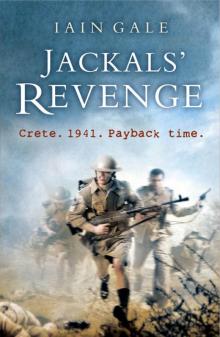 Jackals' Revenge
Jackals' Revenge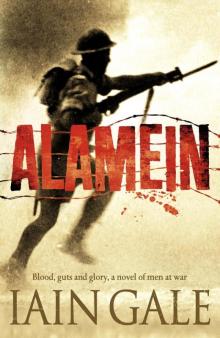 Alamein
Alamein Conspiracy
Conspiracy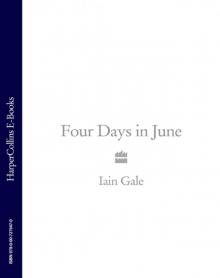 Four Days in June
Four Days in June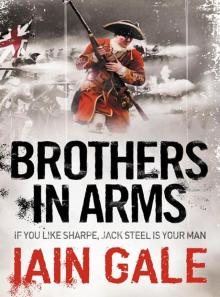 Brothers in Arms (Jack Steel 3)
Brothers in Arms (Jack Steel 3) Brothers in Arms
Brothers in Arms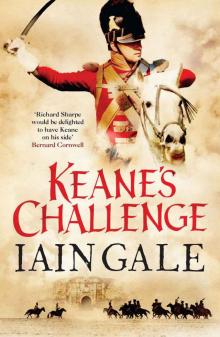 02 - Keane's Challenge
02 - Keane's Challenge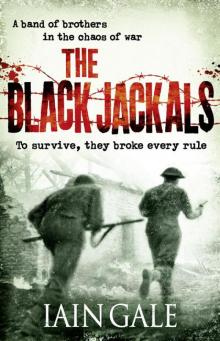 The Black Jackals
The Black Jackals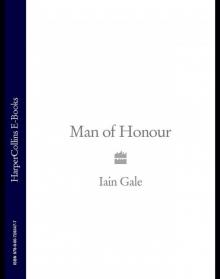 Man of Honour
Man of Honour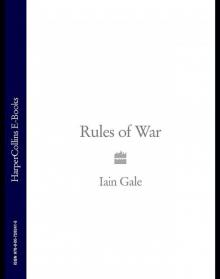 Rules of War
Rules of War